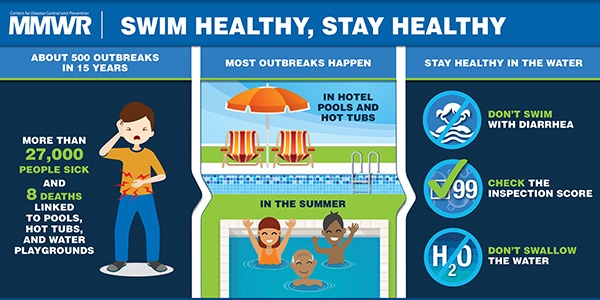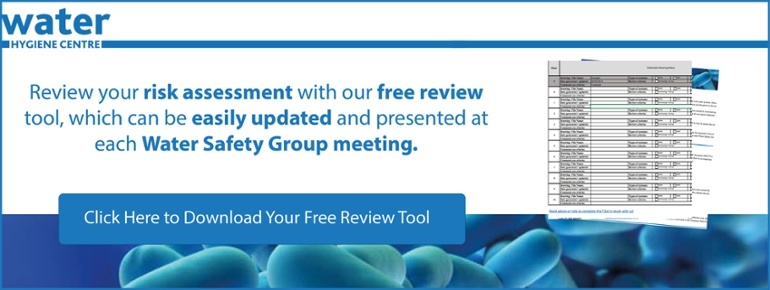
A report from the United States’ Centre of Communicable Disease (CDC) published in April 2018 highlighted the problem of cryptosporidium as the pathogen responsible for most outbreaks of infectious disease originating from treated recreational waters, including swimming pools, spa pools and water play-parks.
Image Credit: CDC
Other outbreaks of ill-health..
Were caused by Legionella bacteria, Pseudomonads and problems caused by water treatment chemicals.
The CDC report is based on data collected between 2000 and 2014 from 46 US States and Puerto Rico, the report detailed:
- evidence of 500 outbreaks;
- more than 27,000 cases of illness;
- eight fatalities;
- 32% of the outbreaks were from hotel swimming pools and spa-pools.
Also stated in the report that 363 outbreaks had a confirmed infectious aetiology; the findings can be summarised as follows:
- 58% caused by Cryptosporidium;
- 16% caused by Legionella bacteria;
- 13% caused by Pseudomonads.
Other outbreaks of ill-health were caused by various bacteria e.g. Shigella & E.coli, the Giardia parasite, Norovirus and water treatment chemicals e.g. excess chlorine, disinfection by-products or altered pool chemistry.
Unlike Legionellae and Pseudomonads, Crytposporidium is not a bacterium, it’s actually a form of protozoa. Although there are many species of Cryptosporidium, only Cryptosporidium parvum is recognised as a human pathogen. The infective cysts of this organism can survive in water treated with chlorine at normal swimming pool concentrations
Symptoms of cryptosporidiosis
Usually starts between one and 12 days (average of seven days) after exposure. The symptoms generally last 10 to 14 days, although occasionally they may last longer. A person infected with Cryptosporidium may develop a variety of intestinal symptoms, including:
- watery diarrhea or loose stool
- stomach cramps or pain
- dehydration
- nausea
- vomiting
- low-grade fever, and
- weight loss
Robust and comprehensive procedures manual / are essential for any pool. But, perhaps most importantly this includes:
- Ensuring that bathers use the toilet and then shower & wash thoroughly, preferably using soap, before entering the pool;
- Ensuring that people suffering from diarrhoea do not enter the pool;
- Closure of the pool in the event of contamination with a loose stool.
Sensibly, the CDC also advises bathers not to swallow the water.
It is not easy to enforce the use of showers or exclude swimmers who may not be visibly unwell. However, there are methods that can be used to raise public awareness, such as prominent signage and the encouragement of staff to both promote the need for showering and remind bathers who have obviously not showered before they enter the pool. The provision of good quality shower facilities on the route to the pool will also encourage effective pre-swim showering.
In addition to standard disinfection techniques, protection from cryptosporidium infections requires pools to be equipped with an effective flocculation (coagulation) and filtration system. The CDC’s report suggests that the main reason for so many infections originating from hotels is that in some cases pool filtration may not be effective due to inadequate equipment.
In the UK operators of swimming pools, hydrotherapy pools, spa pools and other treated similar water systems should follow the guidance provided by the Pool Water Treatment Advisory Group (PWTAG) “Swimming Pool Water”. Spa pool operators should also take account of the Health & Safety Executives HSG282 “Control of legionella and other infectious agents in spa-pool systems”.
Feel free to reach out if you have any questions about the issues mentioned above or if you would like to consult with one of our experts on water hygiene.
Editors Note: The information provided in this blog is correct at date of original publication - June 2018.
© Water Hygiene Centre 2019








